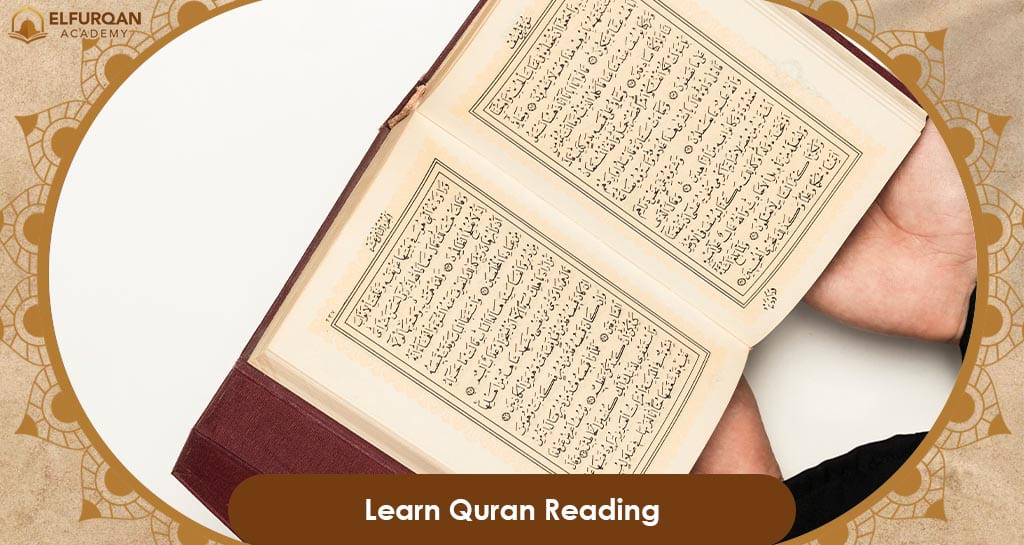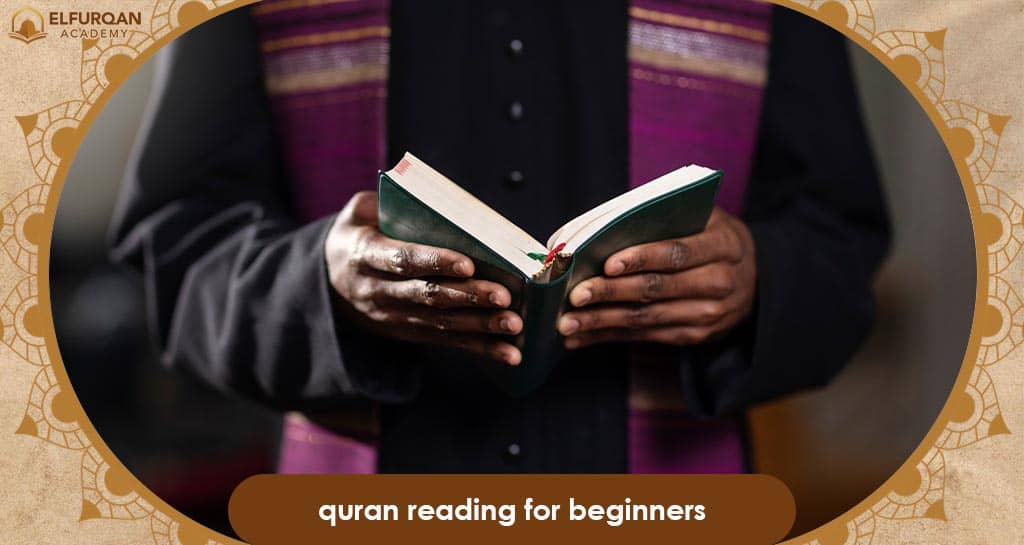Quran Reading is a fundamental skill that holds great importance for Muslims around the world. At El-Furqan Academy, we are dedicated to helping students master the art of reading the Quran accurately and beautifully.
Our experienced instructors provide personalized guidance, ensuring that learners not only pronounce the words correctly but also understand the meanings and context.
Through our comprehensive programs, El-Furqan Academy aims to nurture a deep connection between students and the Quran, fostering spiritual growth and knowledge.
Learn Quran Reading

Quran reading for beginners is a step-by-step process that requires dedication, proper guidance, and consistent practice. At El Furqan Academy, learners of all ages can begin their Quranic journey through structured online classes designed to build a solid foundation in reading the Quran with correct pronunciation and Tajweed. The program typically starts with mastering the Arabic alphabet, phonetics, and basic language rules such as diacritics, letter connections, and pronunciation principles.
Students then progress to reading from beginner texts like Noorani Qaida or Noor Al-Bayan, learning how to recite verses accurately. In addition to recitation, Tajweed rules are introduced to help learners pronounce heavy and light letters correctly, apply elongation (Madd), and follow articulation principles.
The academy emphasizes interactive learning, self-practice, and revision with guidance from qualified instructors, making Quran reading a meaningful and spiritually enriching experience. Whether you’re a child or an adult, ElFurqan Academy provides the tools and support needed to read the Quran fluently and confidently.
Start Your Quran Journey with El-Furqan Academy
Ready to begin your journey with the Quran? Join El-Furqan Academy today and experience high-quality, personalized Quran education from expert instructors.
Whether you’re just starting out or aiming to enhance your recitation and understanding, our programs are designed to meet your needs at every level. Don’t wait—take the first step toward deeper spiritual connection and knowledge.
Enroll now and let El-Furqan Academy guide you every step of the way!

quran reading tajweed
Listening to the Qur’an recited with proper Tajweed has a profound impact on the heart, often moving both Muslims and non-Muslims alike, even if they do not understand the Arabic language. This emotional connection is especially noticeable during Ramadan in Taraweeh prayers, where the beauty of correct recitation becomes clear.
Tajweed, meaning “proficiency” in Arabic, refers to giving each Qur’anic letter its proper articulation and characteristics, as it was originally revealed to the Prophet Muhammad ﷺ through the Angel Jibreel. At the time of the Prophet ﷺ, Arabs naturally spoke with these pronunciation rules, but as Islam spread and language evolved, scholars began preserving Tajweed in written form to prevent mistakes in recitation.
Learning Tajweed is not limited to scholars or expert reciters; it is an individual obligation upon every Muslim who reads the Qur’an, to avoid clear errors that could alter meanings. Through proper Tajweed, one honors the words of Allah and ensures that the Qur’an is recited as it was revealed.
It also deepens one’s spiritual connection, as the Prophet ﷺ instructed believers to recite the Qur’an in a beautiful and melodious voice, emphasizing the importance of reflecting on its message with feeling and reverence.
At El Furqan Academy, students are guided by qualified teachers to master Tajweed with accuracy and confidence, learning how to recite the Qur’an correctly, improve their pronunciation, and develop a deeper appreciation for the divine message. Whether you are a beginner or seeking to refine your skills, the structured and supportive learning environment at El Furqan Academy ensures that each student can recite the Qur’an with clarity, beauty, and proper adherence to its timeless rules.
Read also: quran online
What Are the Benefits of Reading the Quran?
The word Quran itself linguistically means “recitation”, and reciting it is considered an act of worship in Islam—even if one does not fully understand its meaning. Engaging in Quranic recitation brings immense spiritual rewards.
The Prophet Muhammad ﷺ said:
“Whoever recites a single letter from the Book of Allah will receive one reward, and that one reward will be multiplied by ten. I do not say that ‘Alif-Lam-Mim’ is one letter; rather, Alif is a letter, Lam is a letter, and Mim is a letter.”
(Sunan At-Tirmidhi)
This Hadith highlights the tremendous value found in even the smallest effort of reciting the Quran. Each individual letter brings tenfold rewards from Allah.
Special Rewards for Those Still Learning
For those who struggle or are in the process of learning to recite the Quran properly, there is additional mercy and reward. The Prophet ﷺ stated:
“The one who is skilled in reciting the Quran will be in the company of the noble and righteous angels, and the one who recites the Quran while struggling with it and finds it difficult—he will have double the reward.”
(Sahih Muslim)
This encourages every Muslim, regardless of their proficiency, to continue their Quranic journey. Whether fluent or just beginning, every effort is honored by Allah.
Ongoing Virtues
There are numerous Hadiths that emphasize the spiritual benefits and blessings of Quran recitation—especially when done consistently. Regular reading of the Quran not only builds a connection with Allah but also purifies the heart and brings inner peace and guidance.
Are There Etiquettes to Observe When Reading the Quran?
Yes, there are several etiquettes that Muslims are encouraged to observe when reading the Quran, as it holds a central and sacred place in Islam. Allah s.w.t. describes the Quran as noble:
إِنَّهُۥ لَقُرْءَانٌ كَرِيمٌ
“Indeed, this is truly a noble Quran.”
(Surah Al-Waqi’ah, 56:77)
These etiquettes are not merely formalities—they help cultivate a deeper reverence for the Quran and enhance our spiritual connection and understanding.
1. Begin with Seeking Protection from Allah and Reciting Bismillah
One of the key etiquettes is to begin your recitation by seeking refuge in Allah from Shaytan (the devil) through the Isti’azah. This is based on the Quranic instruction:
فَإِذَا قَرَأْتَ ٱلْقُرْءَانَ فَٱسْتَعِذْ بِٱللَّهِ مِنَ ٱلشَّيْطَـٰنِ ٱلرَّجِيمِ
“When you recite the Quran, seek refuge with Allah from Satan, the accursed.”
(Surah An-Nahl, 16:98)
It is also encouraged to quietly recite Isti’azah before Surah Al-Fatihah and other Surahs during each unit of prayer (raka’at).
In addition, Imam An-Nawawi emphasizes the importance of reciting Bismillah at the beginning of every Surah—except Surah At-Tawbah (also known as Surah Bara’ah), where it is traditionally omitted.
2. Be in a State of Spiritual Purity (Wudhu)
While it is permissible to recite the Quran without performing Wudhu (ablution), it is considered Sunnah—highly recommended—to be in a state of purification.
Ali ibn Abi Talib (r.a.) narrated:
“The Messenger of Allah (s.a.w.) used to relieve himself, then come out and recite the Quran and eat meat with us. Nothing prevented him from reciting the Quran except being in a state of major impurity (Janabah).”
(Musnad Ahmad)
However, it’s important to note that physically holding the Mushaf (physical copy of the Quran) does require Wudhu. That said, if the copy contains extensive translation or tafsir (exegesis) that outweighs the Arabic text, it may be held without Wudhu.
3. Recite the Quran Clearly and Deliberately
Another important etiquette is to recite the Quran with clarity, reflection, and measured pace. Allah commands:
وَرَتِّلِ ٱلْقُرْءَانَ تَرْتِيلًا
“And recite the Quran in a slow, measured tone.”
(Surah Al-Muzammil, 73:4)
This method of recitation, known as Tartil, encourages contemplation (Tadabbur) and invites the heart to connect more deeply with the meaning of the verses. Scholars highlight that this practice brings one closer to true reverence and understanding of the Quran.
Umm Salamah (r.a.), one of the Prophet’s wives, described the Prophet Muhammad’s recitation as:
“A clear and distinct recitation, letter by letter.”
(Sunan An-Nasa’i)
What Is the Purpose of Reciting the Quran?
The primary objective of Quranic recitation is contemplation (tadabbur)—to reflect deeply on its verses and grasp their meanings. This is emphasized in the Quran, where Allah s.w.t. says:
كِتَابٌ أَنزَلْنَاهُ إِلَيْكَ مُبَارَكٌ لِّيَدَّبَّرُوا آيَاتِهِ وَلِيَتَذَكَّرَ أُولُوا الْأَلْبَابِ
“This is a blessed Book We have revealed to you, [O Prophet], so that they may reflect upon its verses and those of understanding may take heed.”
(Surah Sad, 38:29)
Through meaningful contemplation, a believer can internalize the Quran’s values and integrate its guidance into daily life. However, this process may be challenging—especially for those who have never engaged with the Quran before, even if they are fluent in spoken or modern standard Arabic.
What Obstacles Can Hinder Quranic Reflection?
True contemplation of the Quran demands time, patience, humility, and a sincere intention to learn. Several factors can hinder this spiritual engagement, including:
-
Lack of focus or mental distraction
-
Impatience and haste
-
Arrogance or overconfidence in one’s knowledge
-
A spiritual barrier or lack of openness to divine truths
Despite these challenges, access to reliable translations and authentic tafsir (exegesis) is more available today than ever. Furthermore, learning classical Arabic—the language of the Quran—can significantly enhance one’s understanding of the deeper meanings and linguistic beauty embedded in the text.
Allah warns in the Quran:
أَفَلَا يَتَدَبَّرُونَ الْقُرْآنَ أَمْ عَلَىٰ قُلُوبٍ أَقْفَالُهَا
“Do they not then reflect upon the Quran, or are there locks upon their hearts?”
(Surah Muhammad, 47:24)
The Nature of Quranic Engagement in a Fast-Paced World
Modern attention spans often favor short, rapid content consumption. Many people today seek instant summaries and quick takeaways. In contrast, the Quran invites a different approach—one of repeated, unhurried recitation and lifelong companionship.
Its wisdom is not limited to a single reading; rather, the Quran continues to unfold new layers of guidance and insight over time. This enduring relevance and dynamic nature is one of the miraculous aspects of the Quran.
Read more: learn quran
quran reading for beginners

1. Find a Qualified Teacher to Guide You
The Quran was first and foremost an oral revelation before it was compiled in written form. The Prophet Muhammad ﷺ received the Quran through the angel Jibril (a.s.), and the Companions (r.a.) memorized and transmitted it orally. Allah s.w.t. says:
“So once We have recited it (through Jibril), follow its recitation closely.”
(Surah Al-Qiyamah, 75:18)
According to a hadith, the Prophet ﷺ used to recite the Quran with Jibril every night during Ramadan:
“Jibril would meet him every night in Ramadan and review the Quran with him.”
(Sahih Al-Bukhari)
This tradition has inspired practices such as Tadarus Al-Quran, where Muslims gather—especially during Ramadan—to read and correct each other’s recitation in a circle, aiming to complete the Quran together.
While today we benefit from recorded recitations and online resources, the most effective way to learn proper Quranic recitation is still through direct learning from a teacher (talaqqi)—a method practiced by the Prophet ﷺ and his Companions (r.a.).
In places like Singapore, even during the pandemic, many classes remain accessible with qualified ARS-certified Asatizah ready to teach.
At a minimum, one should aim to correctly learn Surah Al-Fatihah, as it is a required component (rukun) of every unit of the obligatory prayer (solat).
2. Focus First on Learning How to Recite—Not on Completing the Entire Quran
For beginners, the goal shouldn’t be to finish reading the Quran from cover to cover. Rather, it should be to develop accurate recitation skills. This includes:
-
Proper pronunciation of Arabic letters
-
Mastery of tajweed rules (rules of articulation and pronunciation)
There are several structured methods (Qa’idah) to learn this, commonly used in Singapore, such as:
-
Qa’idah Baghdadiyyah
-
Iqra’
-
Tilawati
-
Ar-Ruh Al-Amin
A teacher plays a vital role in helping students identify their weaknesses, model correct pronunciation, and gradually refine their recitation skills.
It’s also important to know that the Quran is not arranged in a chronological or narrative format like a storybook. Attempting to read it straight through from beginning to end may overwhelm new readers.
Instead, beginners are encouraged to start with the shorter chapters (Surahs)—especially those found in the last section of the Quran (Al-Mufassal). These chapters, mostly revealed in Makkah, address the core beliefs of Islam in a concise and accessible way.
3. Cultivate Determination and Consistency
Learning the Quran requires effort, patience, and perseverance. When challenges arise, students should actively seek help and guidance from their teachers (Ustaz or Ustazah). Progress may be slow, but consistency is key.
4. Self-Revision Through Practice and Recordings
Regular practice, listening to audio/video recordings, and revising what has been learned can greatly reinforce one’s recitation skills outside the classroom environment.
5. Choose the Best Times to Recite
Among the best times to recite the Quran are:
-
After the Fajr (Subuh) prayer
-
At night, especially between Maghrib and Isha prayers
These are spiritually uplifting times that can enhance focus and receptivity to the Quran’s message.
6. Build a Supportive Environment
A strong support system can make all the difference. The ideal support often comes from within the family. Parents can take the opportunity to grow alongside their children in learning the Quran, turning it into a means of spiritual bonding and shared growth.
In conclusion, Quran Reading is more than just reciting words; it is a journey of spiritual enrichment and understanding.
El-Furqan Academy is committed to supporting every student on this path by providing quality education and personalized attention.
Whether you are a beginner or looking to improve your skills, El-Furqan Academy offers the resources and expertise needed to deepen your connection with the Quran and its teachings.
learn more: the best ways to memorize the quran for children
